
Sen. Maria Cantwell is urging President Trump to prioritize modernizing the nation’s weather forecasting system, saying the investment will save lives as well as money down the road. She released a letter to the president Monday, following through on her pledge to provide guidance that the administration can use to upgrade weather forecasting infrastructure.
“The money will save you money, for sure,” Cantwell said in an interview on CBS News Monday. “The kind of investments you could make here are about taking a $20 billion [disaster] event and saying, if we would have done these things in advance, it wouldn’t have cost us that much money. If storms are costing us this much, we have to come up with better solutions.”
The Democratic congresswoman, a prominent voice in environmental policy on Capitol Hill and ranking member of the U.S. Senate Committee on Commerce, Science, and Transportation, which oversees weather and disasters. Cantwell penned the letter in the wake of disastrous flooding that killed at least 135 people in Central Texas. The July 4 flash flood prompted a massive search and recovery operations and raised questions about whether forecasts and warnings could have been more effective ahead of time.
Cantwell’s letter outlined five bipartisan recommendations to improve U.S. forecasting. It comes as the Trump administration continues to make cuts at the National Oceanic and Atmospheric Administration, the federal agency focused on weather and climate, and the National Weather Service, its subagency in charge of daily forecasts.
NOAA is slated to see a 27% reduction in its budget at the start of the 2026 fiscal year, which could impact weather forecasting in a number of ways, including terminating research programs aimed at helping predict future precipitation rates and improve flash flood warning systems. The committee recently held a confirmation hearing for Dr. Neil Jacobs to become NOAA’s new leader.
“Communities across the United States are experiencing more frequent, intense, and costly flash floods, hurricanes, tornadoes, atmospheric rivers, landslides, heatwaves, and wildfires,” Cantwell’s letter said. She cited deadly — and costly — natural disasters that have ravaged communities around the United States in the last two years alone, including the Texas floods as well as last year’s flooding from Hurricane Helene in North Carolina and the devastating fires in Los Angeles and the Hawaiian island of Maui.
Examples like these suggest “that providing Americans with more timely and accurate weather information can avoid billions in property losses and save lives,” she wrote.
Responding to the letter, a White House spokesperson told CBS News in a statement that “the Trump administration has already been hard at work on re-orienting NOAA and NWS [the National Weather Service] away from pursuing climate change activism to instead focus on its core mission and modernizing the agencies’ outdated technology to provide faster, more accurate weather models.”
Cantwell’s recommendations emphasize improvements in how weather data is collected and analyzed, as well as systems for notifying communities of severe weather. They include:
- Upgrading the country’s Doppler radar network with “phased array radar,” a higher resolution system to monitor weather conditions, profile wind patterns and perform aircraft tracking simultaneously. The National Oceanic and Atmospheric Administration has said this type of radar allows for more “focused observations of storms,” compared with Doppler’s abilities, and provides quicker updates for meteorologists tasked with predicting and alerting the public to sudden changes during an extreme event.
- Replacing older weather satellites, relied on by NOAA and its National Weather Service, with next-generation satellites, which “can track lightning strikes that start wildfires, wildfire smoke, red tides that poison fisheries, and generally provide better extreme weather early warning capabilities,” according to Cantwell’s letter.
- Improving NOAA’s Integrated Ocean Observing System, which uses instruments like buoys to collects ocean data that is often integral to weather forecasting, including for search and rescue initiatives and navigation more broadly.
- Investing in supercomputing, data analytics, and a forecasting technique called data assimilation, to increase the accuracy of NOAA’s weather prediction model, which tends to be less accurate than its European counterpart.
- Bolstering weather and climate research through NOAA’s Office of Oceanic and Atmospheric Research. The office is a bedrock of climate prediction efforts worldwide, multiple meteorologists currently and formerly employed by the federal agency have told CBS News. But Mr. Trump’s 2026 budget plan proposes eliminating it altogether.
- Modernizing weather alert systems to help first responders and the public prepare for, and react to, extreme weather events.
- Advancing bipartisan legislation that supports expanding weather research and forecasting endeavors, such as the Weather Act Reauthorization Act of 2024, which Cantwell introduced alongside Sen. Ted Cruz, a Republican who chairs the Senate Commerce Committee.
